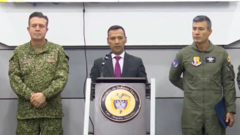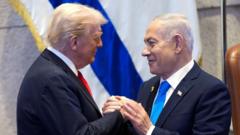Did Colombian Military Strike a Rebel Camp, Claiming 19 Lives?

Published: 2025-11-12 15:00:13 | Category: world
At least 19 people have died in a military airstrike targeting a suspected rebel camp in Colombia's Guaviare province, aimed at a dissident faction of the FARC rebel group linked to drug trafficking. The airstrike, authorised by President Gustavo Petro, marks a shift in his previous reluctance to use military force against rebel groups, coinciding with the collapse of peace talks and heightened pressure from the United States to address the escalating drug trade.
Last updated: 12 October 2023 (BST)
What’s happening now
The recent airstrike in Colombia's Guaviare province has intensified the ongoing conflict involving dissident factions of the Revolutionary Armed Forces of Colombia (FARC). The military operation targeted a camp allegedly led by Iván Mordisco, a prominent dissident leader considered a major player in Colombia's drug trade. This incident follows the breakdown of peace negotiations with several armed groups, forcing President Petro to adopt a more aggressive military stance.
Key takeaways
- 19 fatalities reported in an airstrike on a FARC dissident camp.
- President Petro authorised the strike amid rising pressure to combat drug trafficking.
- The dissident group is accused of child recruitment and illegal activities including drug trafficking and extortion.
Timeline: how we got here
Understanding the sequence of events leading to the airstrike is crucial for grasping the ongoing conflict in Colombia:
- 2016: The FARC signs a peace agreement with the Colombian government, leading to the disbandment of the main group.
- 2021: Dissident factions, including those led by Iván Mordisco, emerge as powerful players in the drug trade.
- August 2023: A deadly explosive attack on a military facility in Cali is attributed to Mordisco's group.
- October 2023: President Petro authorises airstrikes following a collapse of peace talks with the dissidents.
What’s new vs what’s known
New today/this week
The airstrike has resulted in at least 19 casualties, with three individuals detained and three children rescued from the camp. This marks a decisive military action following the failed peace negotiations with the dissident factions.
What was already established
Prior to this, President Petro had been hesitant to employ military force, favouring negotiations. However, the increasing violence and drug trafficking issues, alongside international pressure, have led to a significant policy shift.
Impact for the UK
Consumers and households
While the direct impact on UK consumers is minimal, the developments in Colombia could influence global cocaine prices, affecting drug-related crime and public health efforts in the UK.
Businesses and jobs
The Colombian government's focus on military action may deter foreign investment in regions affected by violence, impacting local economies and job creation.
Policy and regulation
UK policymakers may need to reassess their engagement with Colombia, particularly concerning drug trafficking and international security cooperation.
Numbers that matter
- 19: The number of casualties reported from the recent airstrike.
- 76: The total death toll from US strikes in the Caribbean and Pacific, highlighting broader regional violence.
- 5–10: Estimated number of children reportedly recruited by armed groups in Colombia each month.
Definitions and jargon buster
- FARC: Revolutionary Armed Forces of Colombia, a Marxist-Leninist guerrilla group involved in the Colombian armed conflict.
- Dissident faction: A breakaway group from the main organisation, in this case, the FARC, often engaging in illegal activities.
- Iván Mordisco: A dissident leader of a faction that broke away from FARC, involved in drug trafficking and violence.
How to think about the next steps
Near term (0–4 weeks)
Expect heightened military operations in Colombia as the government seeks to dismantle remaining rebel camps and quell violence.
Medium term (1–6 months)
The Colombian government might intensify efforts to negotiate peace with other factions, balancing military action with diplomacy.
Signals to watch
- Changes in military strategy from the Colombian government.
- Outcomes of any future peace negotiations.
- International responses, particularly from the US regarding Colombia's drug policy.
Practical guidance
Do
- Monitor updates from reliable news sources regarding military operations and peace talks.
- Support initiatives that promote human rights and anti-drug trafficking policies.
Don’t
- Engage in speculation about the outcomes of military actions without verified information.
- Dismiss the implications of Colombia's conflict on global drug markets.
Checklist
- Stay informed about Colombia's political landscape.
- Understand the implications of Colombia's drug policies on international relations.
- Consider supporting organisations that work on peacebuilding and conflict resolution in Colombia.
Risks, caveats, and uncertainties
The situation in Colombia remains fluid, with significant uncertainties surrounding the effectiveness of military action against dissident factions. There is also the risk of civilian casualties and escalating violence, which could undermine peace efforts. Furthermore, the international community's response to Colombia's approach to drug trafficking could shift, affecting future relations.
Bottom line
The airstrike in Guaviare represents a pivotal moment in Colombia's ongoing struggle against drug trafficking and armed groups. As President Petro shifts towards a more militarised approach, the implications for peace negotiations and international relations will be critical to monitor in the coming weeks.
FAQs
What is the significance of the airstrike in Colombia?
The airstrike signifies a shift in President Gustavo Petro's strategy towards military engagement in combating armed groups, particularly in light of pressures surrounding drug trafficking.
Who is Iván Mordisco?
Iván Mordisco is the leader of a dissident faction of the FARC, known for engaging in drug trafficking and violence after breaking away from the main group during peace negotiations.
How has the US responded to Colombia's drug issue?
The US has expressed concerns over Colombia's handling of drug trafficking, leading to sanctions against President Petro and calls for a more aggressive stance against drug cartels.



